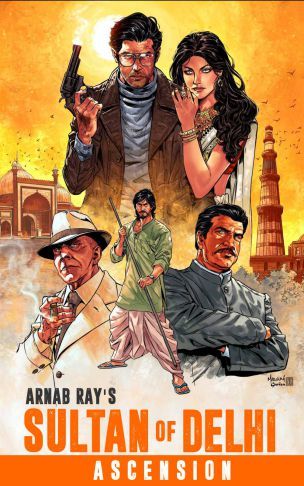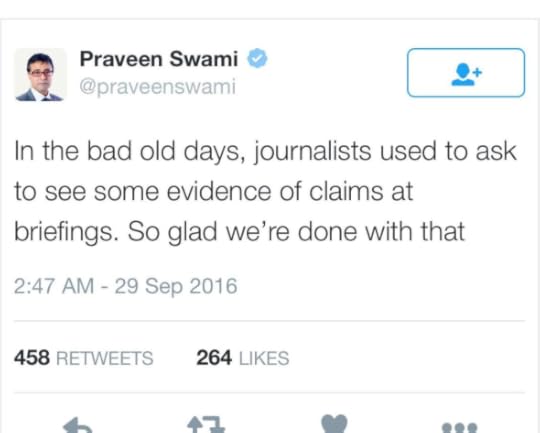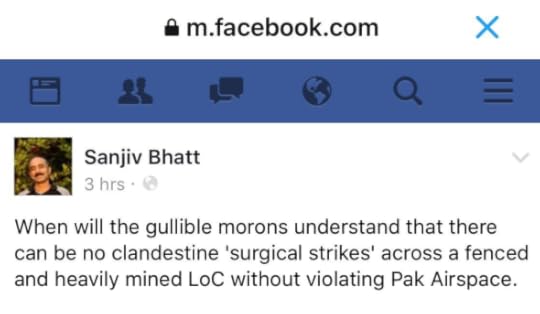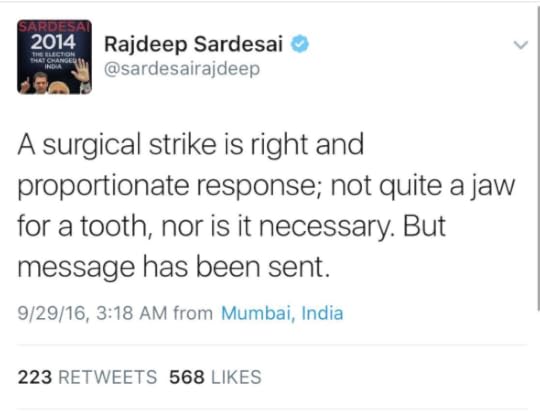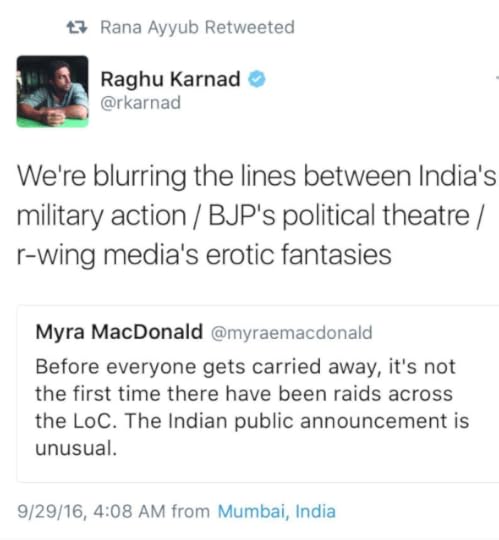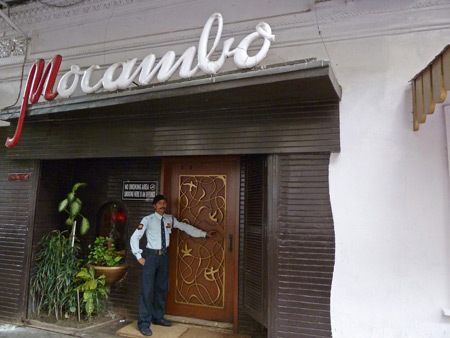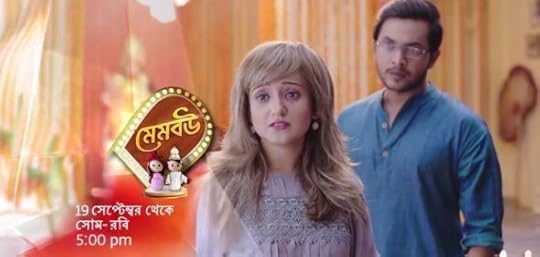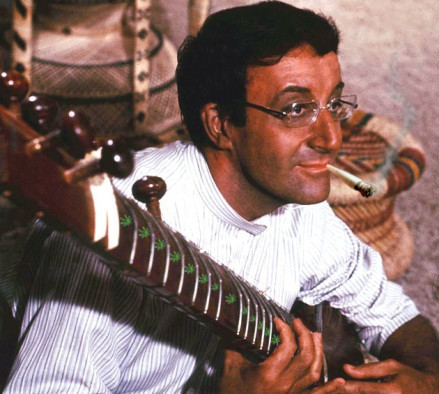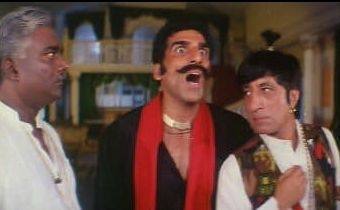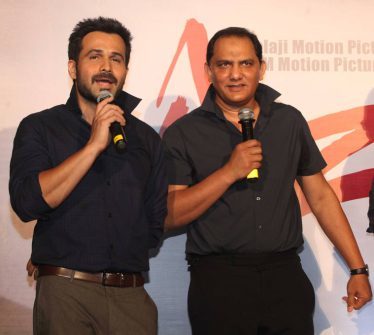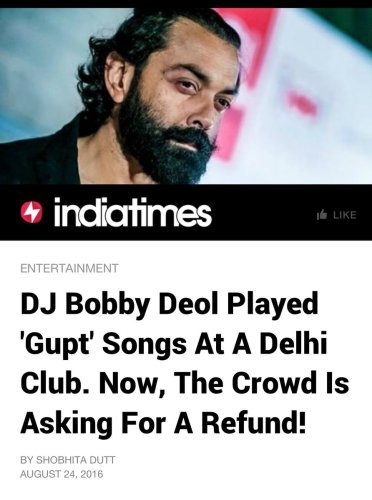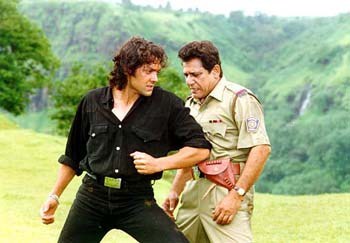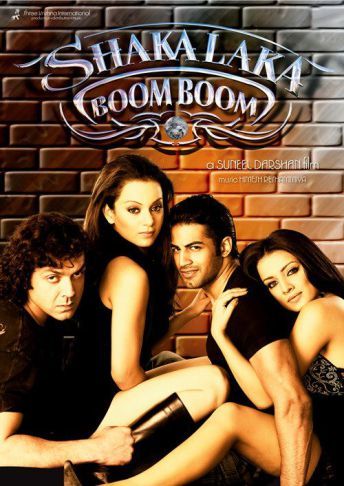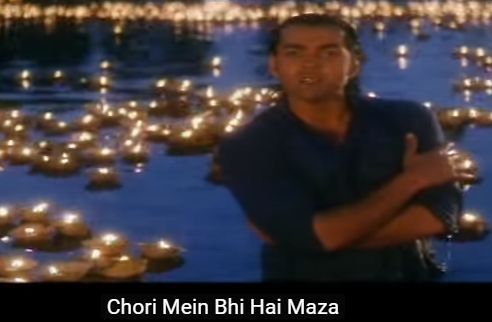Arnab Ray's Blog, page 12
October 29, 2016
Ae Dil Hai Mushkil–The Review
Karan Johar is a creator of worlds. Like J K Rowling, George R R Martin and Gurmeet Ram Rahim. Even though Mr. Johar’s world is populated by what seems to be homo-sapiens, in that they live, breathe, drink, eat, attempt to fornicate and occasionally die in order to resolve a story perfectly (leaving behind letters for an over-precocious child to read), it is very obviously a reality that is not quite ours. In the Johar universe, poverty does not exist even for poets and singers, people travel in personal jets, live in chic lofts in Paris and London with designer furniture, body-fat has melted away instead of the icecaps , the government provides everyone the latest fashions to wear , people do not converse but mushaaira through life, and men and women may lose their marbles occasionally and start thumping themselves on the chest with a flower-pot, but none of that affects their perfect make-up, not an even terminal illness can do that.
There is only one source of conflict in this reality, only one problem that world has not solved.
What is love? What is friendship?
It is obviously a world that provides enduring joy and sustenance to many, as the crores that Karan Johar’s movies have made for his investors will attest to, as well as the multi-star reviews of his latest movie “Aae Dil Hai Mushkil”, not to speak of how many times his tropes have been recycled by other movie directors in Bollywood, and found its way to every bestselling romance that crowds the displays of your neighborhood book store.
In that respect, Karan Johar is, without doubt, one of the most influential artists of his generation.
Which brings me to me.
There was a time when I would enjoy Karan Johar movies. I would accept the conventions of the world, as I do dragons in Game of Thrones and spells in Harry Potter, and go along with the ride, and some of it would be enjoyable, funny, and sometimes even mildly poignant.
“Ae Dil Hai Mushkil” though is none of the above.
It’s deadly boring. And irredeemably muddled.
There is a lot of love, of course, but most of it is of Karan Johar’s ek-tarfa love for his own work, and the works of those of KJo-wannabes like Imtiaz Ali and Ayan Mukherji. Ae Dil Hai Mushkil is a pastiche of other movies, as if Mr. Johar is doing plastic surgery, cutting off a scrap off flesh from the butt of his world and putting it on the chest, and what comes out at the end is a derivative re-assembly of everything you have seen before.
Only when your heart is broken, can you produce true music. Friendship subsumes love. There is someone for you. You can have sex with many but make love to only person. Love is madness. Friendship is peace. You only feel possessive about the one you love. Live every moment as if its your last.
Like little refrigerator magnets, these little maxims are arranged together and re-arranged again, to make three hours of “Ae Dil Hai Mushkil”, and if that sounds horrible, it is.
Now make no mistake. I like Ranbir Kapoor. I like him as Rocket Singh, he has screen presence and star-quality, but there is only so much replaying of the character from “Rockstar” that one can take. Anoushka Sharma is out-performed by Aishwarya Rai, and if that sounds like sufficient reason for the UN to step in on the grounds of a humanitarian crisis, it very well is. And yes, for the ultra-nationalists and the MNSs, you should be thanking Karan Johar for casting Fawad Khan in ADHM. By giving Fawad Khan, an actor of undeniable ability, a role that even Rahul Roy would refuse to do, in terms of its irrelevance and general monochromaticity, Karan Johar has launched a savage surgical strike on our neighbor’s pool of talent, one that neither the Pakistani establishment nor their friends in the Indian media, can deny, caught as it is on film.
Summing up, there is nothing here you haven’t seen before.
And what’s worse, everything you have seen before, you have seen it better.


October 9, 2016
The Issue: A Durga Pujo Short Story
[My latest book “Sultan of Delhi” is now available on Kindle outside the Indian sub-continental region]
“Let me go and offer puja”, the wife says pointing to the Durga idol to the right, up on the stage, “You can sit there, see if you know anyone.”
All married couples know this passage of play. It’s when one of the two makes the other do something that that person doesn’t want, and then compensates by backing off for a certain period of time afterwards. My wife knows I am not happy. I did not want to be here. Weekends are for reading books and watching movies, not for wearing kurta-pyjama that don’t really fit me in the way they were originally tailored, driving an hour, taking three exits, and then paying fifty dollars per person at the door for the dubious privilege of lunch, dinner and “cultural program”.
But it’s Pujo. Are we not going anywhere?
Even if that place is a high school rented for the weekend, and we don’t know anyone there.
So here we are.
“Well why don’t you go to Bangali Association meetings?” My wife had said on the drive here, chilly inside the car even though the heat was turned up high, “Then everyone would not be a stranger.”
I had simply gripped the steering wheel harder. I have been married for ten years. I know not to answer such questions.
“But you used to love Durga Pujo.”
I did. Back in Calcutta. When I had friends. When I could walk into a random pandal at any time of the day and most likely meet someone I knew, from school or college or from “coaching”, when the whole city was extended family.
Not now. Not in the US. Not any more.
And now as my wife walks away, I look around at the assemblage.
The usual stereotypes.
The newlyweds, the ink on their registry papers not even dried. You can always tell the newlyweds. The husband, that engineering college-face I can make out anywhere because I see it every day in the mirror, with that glow of “I am having sex people, and not with my hand” taking pictures of his wife, one after another, here, there, look this way, not that way, bend shoulder a bit, just a shadow of cleavage, but not the real thing for that would be against culture and very chi-chi and “issh ma ki bolbe” and I can see these pictures on timelines on the Interwebs, as the song “Dekhuk para porsite kemon maach gentechi borsite” (Let the neighbors know, I have netted a marvelous fish) plays in my mind, and in his.
As an aside, you can tell how long a couple has been arrived, by watching the line of the sari at the waist, the more the years, the more it rises.
And then there are those whose sari-lines have advanced, over the years, to their necks. The mashimas. They are there, selling gaudy saris, passing off what I am sure are fifteen-year-old hand-me-downs as the “latest design from Calcutta”, and for variety, “ethnic jewelry original from Bankura”, which if I didn’t know better, are massively marked-up items picked up from Dakkhinapan, from the last time said mashima was back home. The unsuccessful businesswomen stand quietly behind their table, while the more dangerous of them, work the crowd, catching the newly weds, and even she knows the sari-line index which allows them to home in on them like a heat-seeking missile. Then, and here I must use my only Gunda-reference, “chikni chikni baatein kaarke” she unloads her wares on those least likely to be able to resist her aggression.
To the left, right near the door, is a wooden bench and table, some paper plates with half-eaten pizzas and overturned soda cans, and these are the first-generations, teenagers and soon-to-be-teens, some as bored as I am, looking at their phone, some sitting grumpily, and I know their parents have revoked their phone privileges. In the whole crowd, these are the ones I feel the most kinship to, none of us quite fitting in but still there, like Mahisasura in the Ma Durga posse.
And then at the center are clumps of chairs, and there in small connected graphs, are people my age, men in one clump, women in another, and children running in between them, shouting noisily, stepping over saris and dhotis, and I am wondering what to do, when I hear a voice calling out my name.
I can’t believe it. I know someone here too.
I turn around. And a familiar face is smiling at me, his arm raised hailing me like I am a cab. I say familiar, because we went to engineering school and we would play carrom in the union room, and we went together to see a soft-core Zalman King porn film at Bhavani once, and I know it sounds strange saying it now but then it seemed the coolest thing to do, but I never really knew knew him. I am seeing him after ten years, and he has changed, and I am not just talking about the extra kilos he has packed on, the soft man-boobs, the insistent image of the nipple straining against his tight-kurta, and flour-like rings of fat around his waist.
It’s his eyes.
They seem dead. Like a decapitated goat, on the butcher’s chopping board. As I approach, a polite smile on my face, a boy of about eight walks up to him, and kicks him on the side of his thigh, and he does not seem to care, does not even look at him, and then the boy holds him by the neck and starts shaking it, and yelling about something, and he still does not react.
I know it then.
Fatherhood.
I pull up a chair and sit next to him. He is in a group of about seven, and he introduces them to me one after another, mid-career professionals, almost identical kurtas, generic names, and DSLR camera hanging around their necks. They were all “doing software”. One hands me a card which said “Archisman Ganguly Photography” and added “my hobby”, lest I think he did this for a living (yes he is “in software” too). After the round of introductions are over, and I have forgotten all their names already, me and my once-friend exchange some status updates, what we have been doing over the past ten years, only to be disturbed once as he gets up and breaks up a fight between his son and his daughter, and then comes back, and sighs.
As my friend runs about, I sit with a moronic grin on my face, pretending to participating in the conversations about me.
I write more code than you. My DSLR has better specifications than yours. My daughter won a county scholarship. My son can recite the alphabet and he is only ten months. I refinanced my house at a better rate. My Honda is better than your Toyota.
I will them to all stand up, and fish out their dicks, and make it into what it is, a Neanderthal “my cock is longer than your” competition, but since we are Bengali men, we don’t do this, because we know we will all lose.
At some time the group gets up, and we all make our way to the side room where lunch is served. A long row of ladies (pronounced “leddies”) stand there, doling out food, proportional to their familiarity with the person holding the plate in front. My friend, who is the general secretary of the Bangali association, gets generous portions, while I get scraps of broken vegetables, half a spoonful of rice, and chicken, that has had the meat molten off it. The chaatni they somehow allow people to take by themselves, and I scoop two large portions on my paper plate, as a gesture of protest, only to find that it tastes like someone put sugar in salsa.
“So are you renting or owning?”
We are back at our seats, and my friend is pigging away, the daal dribbling down the side of his lips.
“Excuse me?”
“Do you rent a house or have you bought?” He repeats, thinking I did not genuinely get it the first time.
It’s a strange question, but still.
He pulls his chair close, ignores the fact that his children are now fighting again, and launches into a monologue on why this is the right time to buy, interest-rates are at historic lows, the real-estate market has bottomed out, and then he asks me, how much I make, and then adds to soften the blow, “in the ballpark”.
Almost magically, his wife appears at his side.
It’s then that I notice.
My friend and she are in color-coordinated clothes.
His wife bends down, gives him a chaste hug, and I see the words coming out of his lips “This is Sreemoyee, my wife, she is an assistant to a real-estate agent, you know she can’t work on H4 but, she can do this, on commission basis, and trust me, she has already sold….”
I shut out the words. Because I know exactly how this is going to end.
At that moment, I feel a tap on my shoulder. It’s my wife.
“Do you want to go?” She asks.
Thinking this might be a loaded question, I reply “No we can stay. There is a cultural program later.”
Sreemoyee helpfully volunteers the fact that she will be singing Rabindranasangeet and also dancing to a medley of Hindi songs and my friend adds helpfully, that the real-estate company is one of the platinum sponsors, and it’s all coming together now, when my wife repeats, this time with a slight firm grip on my shoulder, whose meaning any husband knows, “Let’s go.”
“Did you have lunch?” I ask, just to confirm I got the message right.
“I am not hungry. Can we go please?”
We are in the car, and I know something has happened. So before starting the engine, I wait. This is “old married couple” silent signal for “Talk”
“It’s your friend’s wife. What a…”
“Did she try to sell you a house?” I ask, with a smile.
“She asked me, me, a person she barely knows, “do I have an issue?”
Despite myself, I laugh. An issue. Oh yes, we have issues. Just not the way Sreemoyee thinks.
“When I said I don’t, she went on a long lecture. Why don’t I have kids? Don’t we like kids? Don’t we have plans? Do we have physical problems? If we do, she has a good clinic she can refer us to. Imagine. If we don’t have kids, we will regret it later. Kids complete a marriage. And loads of other bullshit.All this to someone she just met.”
“Maybe she figured she would get more selling a single-family than a townhome.” I point out helpfully, “She is doing business development. In the true sense of the term.”
“We are not coming back”. She says, ignoring my attempt at levity, “I don’t care if he is a friend of yours.”
“Whatever you say”, I say as I put the key into the ignition, “I was kind of enjoying myself.”
I lie. If only to take the marital high ground for the rest of the day.
Somewhere, and I know I am imagining this, Ma Durga smiles.


October 3, 2016
M S Dhoni: The Untold Story—the Review
[This WordPress tells me is my 1000th post]
M S Dhoni. The Untold story.
So what would this “untold story” be I wondered, as I sank into my seat at AMC Barrington, in a surprisingly packed auditorium on a Sunday afternoon.
Was I expecting untold stories about Rhiti sports, cricket enthusiasts, selection room shenanigans, bags of cement and Deepika Padukone?
Of course not. A biopic of a sportsman who is not just alive but also playing the game isn’t going to lift the hood and show us the gunk in the engine.Just not going to happen. That too in India, where slapping of defamation and sentiment-hurting lawsuits is a cottage industry. And to be honest, cinematic biographies of heroes, even the most Oscars-hogging of them and I am talking Richard Attenborough’s Gandhi, rarely rise above being hagiographies, maybe not to the level of MSG Messenger of God, but pretty close.
So no. I was not expecting dark revelations. Not even something lightly gray like why he wouldn’t trust Ambati Rayadu with the strike.
As far as I could tell, “the untold story” was a tag line. Like Sultan of Delhi: Ascension.
But as the closing credits rolled, to a thunderous standing applause the like of which I have never seen in an US theater, I could say I was pleasantly surprised.
There was an untold story there. Actually two, if you think about it.
It takes a village to raise a child, they say, and in this case it takes a small town to make a legend. Very cleverly, Neeraj Pande focuses not just on Dhoni but also his surroundings, the motley group of friends who believe in his ability, failed cricketers, his parents, his first coach, his boss at Indian Railways, his fellow ticket-checkers, and Ranchi and Kharagpur. This is where the film is most successful—in its authentic portrayal of Tier 2 city-life, a world of government quarters, half-dried small-town stadiums, busy platforms, dingy staff accommodation, and small middle-class ambitions. The spotlight wisely is kept away from cricket, we don’t even see Dhoni becoming the captain, and that’s what prevents Dhoni from becoming a yawn-inducing litany of scorecards, or the cinematic version of Boria Majumdar’s Bible.
Instead the drama, and it is great drama, lies in the struggle within, of an extra-ordinary man trying to break free off the tyranny of low middle-class expectations. In one of the film’s most poignant scenes, Dhoni sits hunched over on a bench at Kharagpur, wearing his ticket-checker’s uniform. He is facing a departmental inquiry for chronic absenteeism. People he played with like Yuvraj and Kaif are already bona fide international stars, and he is still spending his life shuttling between two trains and collecting money from the ticketless while practicing cricket on the side. The noose of irrelevant anonymity, a lifetime of playing inconsequential Ranji trophy games in empty stadiums, is tightening around his neck, and he knows it. Then a train stops in front of him. He looks up and he hears his name chanted, in unison, by a million voices. He hesitates, looks around, runs out into the pouring rain, and steps into a compartment, and as the train chugs out, he looks back at the life and the job and the future that he just left for good.
This is an extraordinarily powerful cinematic sequence, even though I am sure it is totally made up.
But then again, if you just wanted fact, there is Statsguru.
Or, and I can do this all day, Boria Majumdar as a biographer.
The film isn’t this excellent throughout. It flags, in the romantic sequences mostly, though one does understand that it is difficult to sell a film without some of that, and, at several places, it walks the line of the ridiculous where Sushant Singh Rajput’s face is superposed, giving the film an EA Cricket 2007 look and feel. What saves Dhoni: The Untold Story throughout is Neeraj Pandey’s ability to bring it back, just when it seems like the asking rate is going a bit too high.
Which brings me to the other untold story.
At one stage, one of Dhoni’s earliest believers, a proprietor of a local sport’s good shop, is asked “Who is Dhoni to you? Why do you keep speaking for him?” to which he says, “I played cricket but I never had the talent. Through him, I can be what I can never be.”
That, to me, is the film capturing perfectly the crux of our relationship with our sports idols.
This is why we are so invested in the success of people who are strangers, and this is why we feel so let down by their failures. We live through them, without realizing it. They breathe our fantasies, of walking into a stadium of thousands and winning the World Cup, fantasies which we can never realize, because we are not good enough, because we cannot take the risk, because we know, deep inside, we won’t be able to get there.
But some people do. They do get there.
These are special people.
Their dreams do not vanish when they wake. For it is their very dreams that keep them awake.
People like MS Dhoni.
Which is why when in the end, he sends Nuwan Kulasekara into the stands, his gaze following the trajectory of the ball, in a sequence that goosebumps even the most jaded of us, no matter how many times we have seen it before, it becomes a moment of fulfillment, our eyes moisten, and we stand up as one and applaud, because for one fleeting second, we are there, without quite understanding it, the imaginary hero of our own little untold story.
Yes. The film does live up to its billing.
That it does.


September 29, 2016
Five Stages of Grief
[Writing this post based on a series of tweets I made earlier today. For two reasons. One: to collect them in one place. Two: to cover my ass for the time when they are photoshopped together, shared without attribution, and then I have to defend myself; that it’s not me who copied but they. This, alas, has happened to me too many times.]
The Kübler-Ross model, or the five stages of grief, postulates a series of emotions experienced by survivors of an intimate’s death, where in the five stages are denial, anger, bargaining, depression and acceptance. [Wiki].
After India’s surgical strikes against Pakistan, our Indian “liberals” have been passing through, what can be identified, as the different stages of grief.
First stage: Denial
Second stage: Anger
Third stage: Bargaining
Fourth stage: Depression
Fifth stage: Acceptance


September 16, 2016
Intellectual Standards Organization
What Chetan Bhagat is to Indian writing in English, Ram Guha is to popular modern history. Unlike the Bhagat though, Mr. Guha is an ISO-certified intellectual where ISO stands for Intellectual Standards Organization, that august body to which I somehow someday hope to gain admittance. Hoping to get some tips and tricks, I sat through his interview on a popular English news channel, and I can say with confidence, I came away enriched.
Mr. Guha’s basic contention, which I am presuming is explicated further in his new book that he was promoting, was that India is more intolerant than at any time it has been since Emergency. Now I was tempted to say that the very fact that he is on saying this on TV contradicts his assertion of suppression of free speech, since at one point, he even brings up Pakistan and North Korea, to imply we are only marginally better than them. I also felt that pinning Canada and Sweden as examples of what we should aspire to be in terms of a liberal society was rather silly, given that these two countries have nothing of the demographics, diversity and history that we have, and that Ram Guha, being a historian should know that most of all, but then I told myself “zyara bhavnao ko samjho” and moved on. Though really I could not move on, perhaps because I think of intolerance as a systemic problem in Indian politics and social life, not one for which one political party can be singled out for, a malaise which draws sustenance from poor protections for free speech afforded by our Constitution, which allows people to be arrested for forwarding cartoons or making social media posts, a Constitution which, surprise of surprises, Guha’s heroes, Nehru and Ambedkar wrote up.
But then what do I know? I am just a struggling author with no bully pulpit, and no TV channel to promote my book.
After this, Mr. Guha rues the absence of right-wing intellectuals in the country, in a kind of Shatrughan Singha from Betaaj Badshah style: “koi jodidaar chahiye jiske saath hum panjaa lada saake”. He later mentions Dr. Bhagwati and then disqualifies him as a right wing intellectual because “He does not believe in the persecution of Muslims”, in one fell-stroke defining right-wing intellectuals with about as broad and as black a brush as possible, namely those that believe in genocide of minorities. Yes. Tough finding someone who is going to stand up and call himself “right wing” after that definition.
Now one would have thought that the hallmark of an intellectual, specially a self-professed liberal one, would be to eschew sweeping generalizations,and instead recognize the uniqueness of multiple schools of thought and nuances, even the ones that he does not agree with. Alas, Mr. Guha uses “right wing” as a synonym for “Not like me” and by extension “Wrong by definition”. According to him, “right wing” implies RSS implies “a slavish obedience to the fascist ideals of Golwalkar”, and if you identify yourself as right, you are all above the above by association. Such gross generalizations used to demonize the “other”, I presumed would have been rhetorical tools of fundamentalists, not “liberals”.
This is not unique to Mr. Guha. Most of his fellow ISO-certified “liberals” are also extremely closed to any kind of signal outside their echo chambers, just as much as “right wingers” are. This becomes even more ironic when they then rue the absence of right-wing intellectuals, after working actively towards making sure such intellectuals are never heard in the public or in the academic sphere, denying them a stage to express their opinions or hounding them out of academic spaces. This the distinguished men and women of the “liberal” persuasion can do, exerting as they do an almost absolute control of academia and mainstream media. Any attempt to break their control is considered intolerance, which is also why they believe social media has reduced the level of intellectual discourse, since in social media they can’t so easily silence the people calling out their inconsistencies, misrepresentations and outright falsehoods on a daily basis.
There were other eye-openers. I learned that identity politics is fine, as long as it is done on the lines of caste. I learned that Ambedkar, Gandhi, and Nehru were Guha’s heroes (ok I knew that before, having read his books), and though I wanted to do to Guha his Golwalkar move, namely read out what Gandhi thought about black people and imply that Guha is racist, since he just referred to Gandhi as his role model. I desisted from doing so, because I do not have the ISO certificate and the forum to do so. And because I think it is wrong to use this line of argument.
I came to know that Mr. Guha opposes a ban on alcohol imposed by Nitish, and instead favors high taxes, the principle being to price the poor out of the market. Realistically though, higher prices would not stop a drunk from drinking, it would just make him even more desperate for money and more prone to abusing his family and engaging in crimes. On the other hand, higher taxes would have no effect on the elites, who presumably wont care whether there is a cess of 120 pc or 150 pc on their Scotch. Not this should be of any concern. As we know, the elites never do bad things when they are drunk, and a number of pavement dwellers outside Best Bakery in Bandra can attest to that.
One would have thought, that a well-founded intellectual argument would either take the form of a libertarian (government should minimally regulate adult activity) or the diametrically opposite, benevolent sarkar mai baap socialist one (government strongly regulates the activities of adults for public good, which if you support, also leads to, by extension, moral control, censorship and other assorted intolerance evils). However what is advocated by Mr. Guha is neither here nor there, which if I didnt know better, I would say simply stems from a belief that poor uneducated people should not be allowed to drink, hence making it more expensive would solve the problem, but elites like him should.
Overall though, I can say I learned a lot, if not on the certificate program for intellectualism but definitely on how to promote a book.
And honestly, right now with “Sultan of Delhi: Ascension” on the verge of release, that’s the skill I most need.


September 13, 2016
Shocked
I am shocked.
Mocambo, the legendary Calcutta eatery to which I have never been to, which might even be the single most Instagrammed place in the city, a favorite haunt of people who refer to themselves as “foodies”, has been accused of not letting a working man, a driver of a car, enter the restaurant as a patron, because the powers-be considered him not appropriate for the establishment, based on his station in life. This has led to the usual social media cycle of outrage, of people downvoting a Facebook page which was not the restaurant’s, and of news media passing statements of doubtful provenance as ” the official” franchise response, and of shares and comments and Whatsapp messages and other forms of digital mayhem.
As I said before, I am shocked.
Not at the alleged behavior of Mocambo, but by the fact that so many Calcuttans have gotten over feudalism. Based on assertions made in social media spaces, Calcuttans, without fail, sit with their hired help on same couch, eat at same dinner table using same utensils with the maid at the same time, and sleep on same bed with driver, only one of the above which I made up. It seems from the universal outrage, that Mocambo is the only place left in Calcutta when a driver would be denied a place at the table, and that the reason Mocambo did it was because they were behind-the-times, not because they felt their other patrons would be offended.
I am shocked. Because, based on what I see on Facebook and as we know people always say the truth there, Calcutta has definitely evolved from what I knew it to be, its once deep schisms between bhodrolok and chotolok gone to be replaced by a hunger for Likes and absolute egalitarianism.
Save that one restaurant that serves pepper crab devilled.
I indeed am shocked.


September 11, 2016
The Legend of Mem Bou
There are many privileges of being born Bengali.
I can live in a glorious past. I can appreciate Ray without subtitles. I can marvel at the Ma Maati Manush alliterative chchondo of Didi’s poems, by the grace of Ma Sharda. I can tremble my voice during elocution. I can consider telebhaja to be an industry.
And most of all, I can derive pride from the awesomeness of the new viral meme.
Mem Bou.
For those not fortunate to have been born in whatever the state is now called Bengal, let me explain what Mem Bou is.
Mem Bou is a series to be aired on Star Jalsa, around the same time that the Blair Witch Project comes out, and I shall say it is no co-incidence. Only two teaser trailers have been shown to the world, and the combined 100 seconds of their run-times have been enough to imprint it indelibly on the psyche of the global Bengali, like the “Maine makhon nahee khaiyo” innocent face of the released-on-bail Trinamool-heavyweight Madan Mitra, and the paunch of Ranjit Mullick, creasing out from his tight police uniform in “Indrajeet”.
In the first of these teaser trailers, a lady is taking pictures on the streets of Bongland when a Bangali gentleman, whose eyes start overemoting even before he says a word, gets angry that “these foreigners” are engaged in poverty tourism. The camera then focuses on the the said foreigner.
It’s a lady, who looks like someone put Monali Thakur outside in the sun, like pishimas do to dry boris, and then someone spread moida (flour) over face to make her look “white”, and if that was not enough, put a blonde wig (which looks like it was yanked off the back of a raccoon) on her scalp, and if you believe she is Caucasian at that point, you also believe that some stranger wants to transfer 100 million dollars to your bank account, even though he has misspelled your name. Then she speaks, in a Bangla accent that would make Bob Christo hit his bald pate on brick, and with such sweetness that would break Somnath Bharti’s xenophobic heart, “Haapni keee bolchen, shob bhideshira yekrokom howe naaaaa”.(What are you saying? Not all foreigners are alike) After that, she reaches out and says, in what Bengalis think is an Amreekan accent, “Hi I am Carol” and if this was during Christmas we could have called it “Christmas Carol” and broken Tiny Tim’s heart all over again.
In the second trailer, said Mem Bou is attending what seems to be Durga Pujo at someone’s house, when the matriarch crunches her face, and angrily points out that the presence of the “phiringi” has made the house unholy, which sums up pretty much the Bengal government’s attitude towards foreign industry. The hero holds her arm dramatically, and just when you think he is going to stand up to the matriarch, he , like the Bengali boy he is, actually turns to the mem bou and admonishes her for coming to their place on this day. To which she makes a face like the one one makes after having too many oily begoonis for snacks, and says “Haami buj”t’ei pyaari nae, haami sorry, “t”umra kyano hamaare beedyeshi byole dyure “t”hyele dao” (I didn’t understand, I am sorry, why do you push me away because I am a foreigner), after which she becomes the head of the Congress party, but that I am sure will be revealed in the next teaser.
Needless to say, there has been much chatter over this, over Whatsapp and in living rooms, over the source of the accent, the provenance of the blonde wig, and how many luchchis can be made from the flour that has been put on the Mem Bou’s face, and whether this is the official end of the Bengali “We are intellectually evolved” hubris.
Unlike many other Bengali uncle and mashimas of my age though, I am more Bullah-ish about “Mem Bou”, because I see it in the potential of “Chowdhury Pharmaceuticals”.
For those millennials, who have no idea of what I am referring to, “Chowdhury Pharmaceuticals” was the defining Bengali TV serial of my age, something so epic that even Satyajit Ray watched it regularly, or so we are told. Starring Subroto Mukherjee, then Congress and now Trinamool heavyweight and MoonMoon Sen, then state treasure and now Trinamool heavyweight, and as villain, George Baker, then the token “saheb” of Bengali film industry and now BJP politician, it had controversial scenes shot at Tolly Club, of not only Moon-square in swimsuit, but also of Subroto Mukherjee, a combined cornucopia of skin and flab that strained the flesh-tone rendering of early color TVs, like Bangali Jon Snow and Ygritte in the water of the cave but a bit more disturbing, dialogues like “Don’t be shentimental, be practical” and “Ami tomar chuler gora theke nokher aga porjonto chai” (I want you, from the root of your hair to the edge of your nails), lines that have stood the test of time, and sequences like where Subroto Mukherjee angrily tries to put a pen inside a pen-stand, and the pen bounces away and the camera keeps rolling. [Diptakirti has more here]
I know I may be pre-mature but I think I have found in the actress who plays “Mem Bou”, Vinita Chatterjee, a bit of MoonMoon. Ever since MoonMoon Sen went over to the world of politics, opining on how to look glamorous while campaigning in the heat and the appropriate use of gamcha, and other matters of national importance only she can handle, there has been a lacuna in the Bengali popular sphere, of actresses with the Moonmoonian dialogue delivery style, the regular use of phrases like “bhishon bhaabe”, that indescribable nyakamo or faux-feminity that MoonMoon made her trademark , and the confidence.
Some of that style and panache pours forth here, where she discusses her absolutely busy schedule and her top-of-line projects including roles opposite Harman Baweja’s brother, and how, had her talent not been discovered at a party, she would have gone on to become the next Barkha Dutt, a possibility that makes me want to thank the persons who unearthed her even more.
But what makes me happy about Mem Bou is that this is time for payback. For decades, Hollywood has made Caucasian actors do brown-face, and made them speak in a sing-song Indian accent, that is evidently inauthentic but which serves the purpose of feeding into the Western stereotype of the coolie trying to speak the proper tongue, a stereotype perpetrated from Peter Sellers to Mike Myers. And now the tables have been turned, with a very obviously Bengali-Indian, using white-face and blonde-wig and bad accent to do unto others what have done unto us.
Like Ganguly’s bare-bodied desecration of the holiest of holies of the English was a generational middle-finger at British snobbery and superiority, this is a defining counter-salvo at decades of cultural appropriation and biased casting.
Which is why I stand with Mem Bou.
Or to put it more appropriately, Mem Bou, haamra “t”umar songe dyanriye yaachi.
[My next book, Sultan of Delhi: Ascension from Hachette is now available for pre-order. Here at Amazon and at Flipkart. ]


September 4, 2016
Gunda Becomes Jawaan
Gunda turned eighteen this weekend. Or to put it in Gundese “Haye haye mera Gunda jawaan ho gya, toota hua teer kamaan ho gya”.
What began as a closely guarded secret in male dorms across the country, like a shared password for that orgy in “Eyes Wide Shut” except there are no women, all men, and all of unappealing body-types, and while imagining this, also imagine the stench of sweat, the musky odor of wet underwear drying in the breeze, and only then do you begin to get a faint flavor of the origin of this global phenomenon.
For today Gunda is a cult. Some go beyond. They say it is a religion, they say it is an identity. Go to a party and meet a stranger who drops the fact that he is a Gunda fan, and even though you may not know his name or anything else about him, yet you feel you are brothers for life, and you know exactly, exactly, what is going on in his mind. While the rest converse on mortgage rates, digital photography, whose garden grows the biggest tomatoes and what a lovely movie “Zindagi Milegi Na Dobara” was and how much they look forward to “Rock On 2”, you steal glances at the man, and a silent communication takes place, and you know, just know, that just like you, he wants to scream “Mera naam hai Bullah, rakhta hoon main Khullah” , before overturning the buffet table.
It is not easy to be part of the Gunda lifestyle. Those whose ma is chudail ki beti and baap shaitaan ka chela are not easily accepted in polite company, especially when people know that when they say “Oh so this is your boy” they are actually thinking “Toh yeh hai tera haseena ka paseena”
As an early adopter, much much before it became mainstream, and a shameless evangelist of the religion of Gunda, I have had to make personal sacrifices. I have been judged. I have been ostracized. I have been unfriended. I have been unfollowed. There are places I shall never be invited to sit. But overall it had been a small price to pay, certainly not like being thrown to lions like Christians were or being slapped by Sardesai like Hindus are.
For I have a personal relation with Gunda. A deeply personal one.
I find in it prophecies, like wise men find in holy books. Coffin-chor netas who look like George Fernandes. London se sex ki goli long before Pfizer’s Viagra. Not just self-driving cars (even Salman Khan was using them in the 90s), but cars that exhibit autonomous swarm behavior, as manifested in the fight scene where white Ambassadors spontaneously rearrange themselves, without drivers. Just a month ago, I read about this man at the Olympics specially hired to distribute condoms among athletes, and immediately I thought of Nirodh Kumar, distributing “garam paani” and “moza” to customers in Bed number eighteen of Lucky Chikna’s “Latakta Circus”. Gunda had seen it years ago. And when Kejriwal called a minister of his cabinet “gandi machchli”, I could not but be reminded of the line “Kyon re paap ki paani ki machcli phir shuru ho gayee teri khujli”, the similarity “khujli” and “Kejri” definitely not being an accident.
And that’s not all.
In Gunda, I find in it the strength to carry on, especially on those days when the world just rips apart my pantloon and some more. “Dhande pe baithi hai to buddha kya, jawan kya, kya chhota kya bara, kya baitha kya khada” captures poetically the human condition, and I have repeated it to myself, like one does a mantra, so many times that I cannot remember, and it has never failed to give me courage, when I most needed it.
And finally, I find in Gunda a refuge, a safe place, a strange kind of comfort. When nothing makes sense any more, only then do I understand what “Kyon tu baraf peeta hai whisky mein daal ke” means. When I fall behind, be it in the rat race or in a fantasy cricket tournament, I tell myself “Woh bhi peeche se angootha lagake” and rush forward, for only when you come from the back, can you truly leave your mark.
Gunda makes me laugh. Gunda makes me cry. It draws me in, and it never ever lets me go.
Always familiar yet startlingly new, if this is not art, what is?
Happy eighteenth, my old friend.
You are the anthem of my life.


August 31, 2016
Azhar—the Review
There is a scene in Azhar where Azhar has gone to watch a film with Naureen, his first wife. As Nargis Fakhri playing Sangeeta comes onto screen, her lips swollen like she walked into an Ambrose bouncer, it is Naureen who almost gets aroused, commenting to Azhar “kya khoobsoorat aankhein hai uski” and for those who have grown up in Bollywood, we know that”aankhein”is often an euphemism for some other components of a woman’s body. While wife getting turned on by another woman is a long-standing fantasy among Indian men, and by this time you should be thinking of Khulbhushan Kharbanda’s spontaneous eruption in front of bottles of “Crush” after stumbling upon his wife Shabana Azmi writing sensuously with Nandita Das in Fire, Azhar is immensely distraught by the licentiousness of the dance, and looks uncomfortably from side to side, like he did when the ball was bouncing near his head on fast tracks.
Yes that’s how innocent and honorable Azhar is, in his approved eponymous hagiography. Why did he take money from bookies? So that he bankrupts them, and prevents them from offering the same money to other players. Yes. You read that right. That’s the final reveal. Why was his career finished? Because some player suspiciously called “Manoj”, himself suspect in his loyalties, resented Azhar being the boss, and carried a grudge of having been seen nude in the dressing room. Why the extramarital affair? Because the first wife was unavailable, and how do we know that? Azhar sits down to a dinner with Naureen, asks her about the biriyani, she says “it’s good”, and Azhar asks “What about it is good? The rice? The spices? The flavor?” and Naureen says “It’s all good”, and Azhar loses his cool because no husband likes a wife who can’t deconstruct biriyani and the next thing you know he is in the arms of his mistress. Not convinced that he is an amazing person? Here is more. Azhar wants to tell his wife the marriage is over, but there are people at the house, so what can the poor man do except announce it on TV, leaving his wife not just heartbroken but also embarrassed?
Because you see Azhar did nothing wrong. Absolutely nothing. Everyone around him was bad, a resentful “Manoj”, a philandering “Ravi”, a difficult “Navjot”. And if throwing mud at everyone else in order to make him look good isn’t bad enough, there are bare-faced lies. Matches Azhar was accused of having fixed, are mixed with other matches, like the one in Bangalore where he got a bad decision, so that unless you lived through the Azhar era or read Cricinfo while others go to Pornhub, you would not realize that the game that started was not the one that finished.
But all this would be forgiven, if Azhar worked as a film. It does not. Amateurish and disjointed, with acting quality and direction straight out of a bad 90s movie, the kind where every extra in a room says “Dekho dekho woh Azhar” all together, and where comedy is some guy by the name of Reddy speaking “South Indian” Hindi, Azhar makes Kanti Shah look like Kurusawa. Emran Hashmi, who has three stock facial expressions “I am going to kiss you”, “I miss kissing you”, and “I have kissed someone else”, tried to go method by studying Azhar’s mannerisms. But what comes out is a parody. Besides the fact that Hashmi’s tongue is about as flexible as Azhar’s wrists, and both find gaps which others can’t reach, the decision to cast him is puzzling, though I doubt if even Daniel Day Lewis would be able to rise above the material. Prachi Desai looks much more convincing as Naureen, and is the most competent actor in the whole film, Sangeeta Bijlani should have sued the producers just because they got Nargis Fakhri to play her. Lara Datta, who is not playing Brian Lara but the prosecuting lawyer, who gets notes passed to her by the man she is prosecuting, hinting at a darker desire on the part of Azhar to crack three successive centuries with ladies too, looks bored throughout. Khulbhushan Kharbandha (yes of Fire fame) says some supposedly profound words in a Hyderabadi accent, of the Rajesh Khanna “Gaa beta gaa” variety in Disco Dancer, but does not make it past the first few reels.
The tragedy here is that this film could have been so much more. Azharuddin is India’s most controversial sports figure, a man of little privilege by birth, who broke through to the top purely on the dint of freakish talent only to fall as high as he rose, a man whose life has so much drama on and off the field, that it should not have been difficult to make a passably interesting film about him. Yet the director fails spectacularly, and that takes a Dodda Ganesh level of ability.
I wish I had not seen this film. And I say this, not as a purveyor of bad Bollywood, but as a fan of the man himself. Growing up, my favorite cricketer was Azhar. Not Sachin. Not Dada. Azhar. I was there, at the Eden, for his third century, and also when he carved England to all parts of the field, his bat twirling like a sword as it came down in a perfect arc, catching the light of a setting sun and of batsmanship of the kind that we will never seen again, the ball whizzing along the green grass in a blur of crimson, the English cricketers standing tiredly, as much audience as the eighty thousand else.
That is how I want to remember him.
Not as the man he became.
And definitely, not the man he wants us to believe he was.


August 24, 2016
Stop Hating on Bobby Deol
Between Ashutosh’s assault on the English language, the activities of Gau Rakshaks, the melting of the ice caps, and the shamelessness of Indian sports officials, I thought I had become impervious to the evils of the world.
Till I saw this.
According to a source, Bobby played the tracks from his old film Gupt throughout the night! Yes, that happened! And by the end of the night, the people at the club were left fuming, and were seen asking for a refund from the hotel officials! [Link]
Who the eff are these wannabes? I played songs from Gupt, in a loop, for five years, and I got my PhD. And they can’t take it for one night, and that too from the man whose film it was?
They deserve Pulkit Samrat. And Somnath Bharti. And Raaz the Reboot. And KRK dancing to Beat Pe Booty. And Honey Singh desecrating “Dheere dheere se”.
They do.
Forgive me for I am attached to the songs of Gupt. And to the movie. It has given me pickup lines to use. Like “Yahaan wahaan idhar udhar sab kuch tere paas hai”. It has given me pickup lines to avoid. Like ” ‘Main ek salesman hoon. Ishq aur mohabbat ka salesman. Tum jaisi khoobsoorat ladkiyon ki zaroorat puri karta hoon aur woh bhi muft mein”. It has given me lines that have, many times, saved my marriage. Like “kuch baatein gupt raheni chahiye”.
I have seen Gupt, more than twenty times I suppose, and every time I have found something new—one more rose on Bobby Deol’s rose-studded jacket, one more screech from Kajol, one more meaning to the lyrics “Oonchaiyan Gehraiyan”, one more similarity to Papillion, one more reason to watch Gupt again.
And for these rapscallions to dishonor this.
To quote a Bobby Deol movie song “Bardasht Naheen Kar Sakta”.
Actually the problem is today’s kids. They have no respect for institutions.
For Bobby Deol is one.
If Sunny is violence, Bobby is sex.
If Sunny pulls handpumps, Bobby pulls gown-strings.
If Sunny is Boom Boom, Bobby is Shakalakaboomboom.
Suave. Stylish. Bobby Deol.
Even when this happens.
Like really. What do these party-goers know?
Twinkle Khanna’s mother debuted as Bobby and she debuted with Bobby.
How amazing is that?
How many people can play the character of Badal in Barsaat and then the character of Badal in Badal, or Raj Malhotra in Thank You and Raj Malhotra in Ajnabee or act in both Barsaat as well as A Sublime Love Story: Barsaat? How many people can hack the most awesome password ever, “Everything Is Planned” using a technique that would make Kevin Mitnick go “Woh kya hai, Gupt Gupt oh yeah” , or travel from Switzerland, a land locked country, in a boat (Ajnabee) or emote opposite wooden furniture (Upen Patel), or become Bhagat Singh or play an illusionist wearing a Sombrero in “Players” or sing the Congress motto “Chori Mein Bhi Hai Maza” (Kareeb) while pulling a lady out of the water?
So please. Get your refund and buzz off. Blow it on Varun Dhawan or Sid Malhotra or whatever. If I had my way, I would sue your butts for sedition.
But you don’t even deserve that.
You don’t deserve Bobby.




